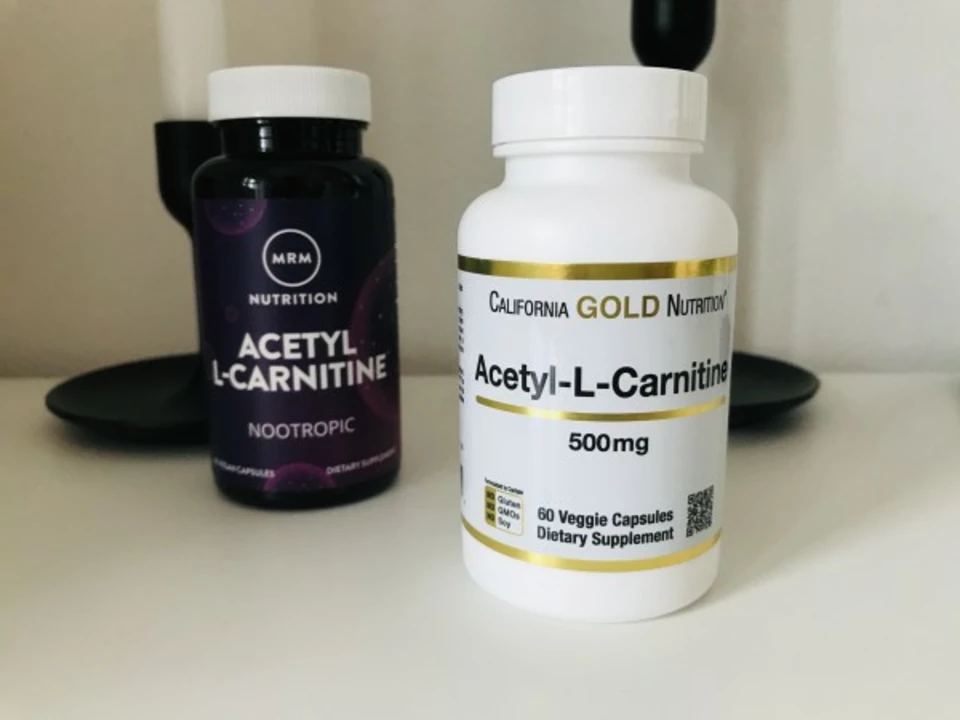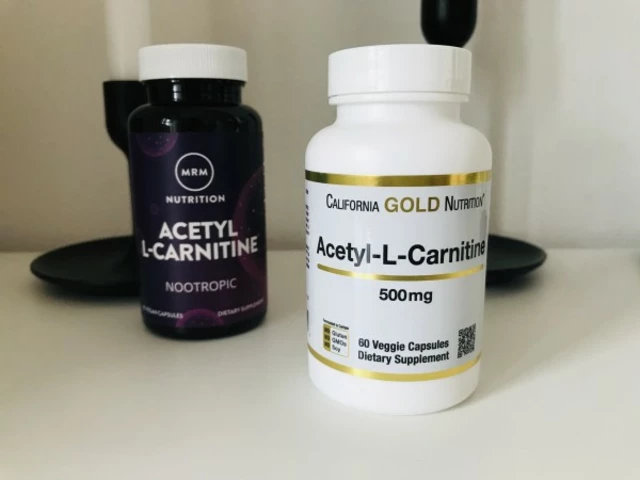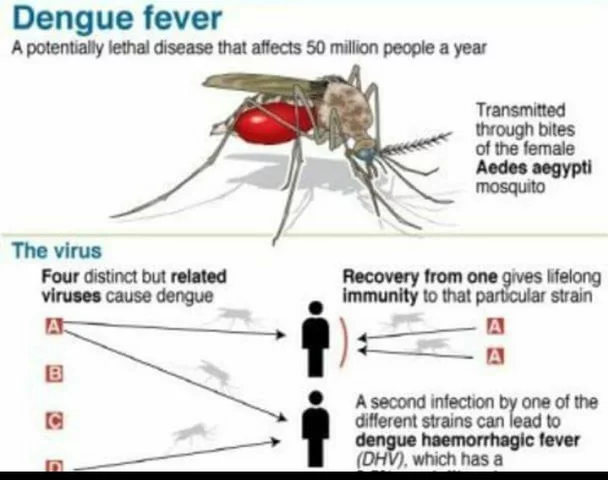Introduction to Acetyl-L-Carnitine and Male Fertility
Acetyl-L-Carnitine (ALC) is a naturally occurring compound that plays a vital role in our body's energy production process. Over the years, it has gained significant attention for its potential role in improving male fertility and reproductive health. In this article, we will explore the various ways ALC can influence male fertility and reproductive health, as well as discuss different research and studies that support these claims. Let's dive into the world of ALC and discover how it can help improve male fertility.
The Connection Between ALC and Sperm Production
One of the most significant ways ALC impacts male fertility is through its role in sperm production. Sperm cells require a tremendous amount of energy to function properly, and ALC is critical in providing that energy. It helps transport fatty acids into the mitochondria, where they are converted into energy that powers the sperm cells' movement and function.
Research has shown that ALC supplementation can improve sperm count and motility, leading to increased chances of successful fertilization. This is particularly important for men with low sperm count or poor sperm quality, as improving these parameters can dramatically improve their fertility potential.
ALC's Impact on Sperm Quality
Another essential aspect of male fertility is the quality of sperm cells. Sperm quality encompasses factors like morphology (shape and structure), motility (ability to swim), and concentration (number of sperm per milliliter of semen). ALC has been shown to improve all these aspects of sperm quality, making it a promising supplement for men looking to optimize their reproductive health.
Studies suggest that ALC supplementation can help improve sperm morphology, particularly in men with a high percentage of abnormal sperm cells. This is crucial, as normal sperm morphology is a vital factor in determining the likelihood of successful fertilization and pregnancy.
Reducing Oxidative Stress with ALC
Oxidative stress is a significant factor that negatively impacts male fertility. It occurs when there is an imbalance between free radicals (harmful molecules) and antioxidants (molecules that neutralize free radicals) in the body. Free radicals can cause damage to sperm cells, affecting their function and reducing fertility.
ALC acts as a powerful antioxidant, neutralizing free radicals and protecting sperm cells from oxidative damage. By reducing oxidative stress, ALC can help maintain sperm health and improve overall male fertility.
ALC's Role in Testosterone Production
Testosterone is the primary male sex hormone and plays a crucial role in sperm production and overall male reproductive health. Low testosterone levels are associated with reduced sperm count, poor sperm quality, and even infertility. ALC has been found to stimulate the production of testosterone, potentially improving fertility in men with low testosterone levels.
By boosting testosterone production, ALC may not only improve male fertility but also enhance libido, sexual performance, and overall reproductive health.
ALC and Erectile Dysfunction
Erectile dysfunction (ED) is a common problem that affects many men, and it can have a significant impact on a couple's ability to conceive. Studies have indicated that ALC supplementation may help improve erectile function by increasing blood flow to the penis and improving the function of the endothelial cells that line the blood vessels.
By promoting better blood flow and improving erectile function, ALC may help men overcome ED and improve their chances of successful conception.
ALC's Effect on Male Aging and Fertility
As men age, their fertility naturally declines due to factors such as reduced sperm production, poor sperm quality, and hormonal changes. ALC's ability to improve sperm production, quality, and hormonal balance can help counteract these age-related declines and maintain optimal fertility even as men grow older.
By supporting healthy aging and maintaining fertility, ALC can be a valuable ally for men looking to start or expand their family later in life.
ALC Supplementation Recommendations
While ALC is an essential compound for male fertility and reproductive health, it's crucial to use it safely and effectively. The recommended dosage of ALC for fertility purposes typically ranges from 1,000 to 3,000 milligrams per day, taken in divided doses. It's essential to consult with a healthcare professional before starting any supplementation regimen, as individual needs and circumstances may vary.
It's also important to remember that ALC is just one piece of the puzzle when it comes to optimizing male fertility. A healthy lifestyle, including a balanced diet, regular exercise, and stress management, is critical for maintaining optimal reproductive health.
Conclusion: The Role of ALC in Male Fertility and Reproductive Health
Acetyl-L-Carnitine has emerged as a promising supplement for improving male fertility and reproductive health. Its ability to boost sperm production and quality, reduce oxidative stress, and support healthy hormonal balance means ALC can be a valuable addition to a man's fertility optimization plan. However, it's essential to remember that ALC is just one component of a comprehensive approach to male fertility and reproductive health. A healthy lifestyle, regular medical check-ups, and the guidance of a healthcare professional are all crucial for achieving and maintaining optimal fertility.








Meghan Cardwell June 2, 2023
Acetyl‑L‑Carnitine (ALC) definitely merits a closer look, especially given its role in mitochondrial fatty‑acid transport. The biochemical jargon can be dense, but think of it as the cellular fuel‑pump that keeps sperm motility humming. Clinical trials have highlighted improvements in both count and morphology, which is encouraging for anyone tracking reproductive metrics. It also dovetails nicely with antioxidant strategies, reducing ROS‑mediated damage. In short, ALC is a multifaceted adjunct in the fertility toolkit.
stephen henson June 6, 2023
Totally agree, ALC sounds promising! 😊
Manno Colburn June 10, 2023
When one delves into the ontological substrate of male reproductive vigor, ALC emerges as a quasi‑alchemical catalyst, bridging the gap between biochemistry and existential hope. It is not merely a molecule, but a conduit for the very essence of vitality that threads through each spermatogenic cell. The mitochondrial matrix, awash with acetyl‑carnitine, becomes a bustling metropolis of ATP, revving up motility like a finely tuned engine. Yet, one must ponder: are we merely treating a symptom, or are we unlocking a deeper, perhaps primordial, drive? The literature, festooned with randomized trials, whispers of enhanced count and morphology, yet the murmurs of oxidative stress linger like shadows at dusk. I contend that ALC's antioxidant armor does more than neutralise free radicals; it whispers reassurance to the DNA helix, safeguarding its integrity. Moreover, the hormonal cascade, nudged by ALC, may elevate testosterone, though causality remains a labyrinthine puzzle. Some skeptics deride these findings, branding them as placebo‑laden hype, but the empirical data stubbornly persists. In practice, dosage titration from 1 g to 3 g per day must be calibrated, lest we venture into the realm of over‑supplementation, where diminishing returns beckon. The interplay with lifestyle-diet, exercise, stress mitigation-forms a symphony wherein ALC plays a salient, albeit not solitary, melody. Thus, while we celebrate its potential, we must temper enthusiasm with rigorous scrutiny, lest we mistake correlation for causation. In the grand tapestry of male fertility, ALC is a vibrant thread, but not the sole weaver of destiny.
Namrata Thakur June 14, 2023
What a fantastic overview! I love how you broke down the science into approachable bits while still keeping the excitement alive. The connection between ALC and reduced oxidative stress is especially crucial, as it directly protects the precious sperm DNA. It’s uplifting to see that something as simple as a supplement can make such a tangible difference when paired with a healthy lifestyle. Keep spreading the good vibes and the solid info!
Chloe Ingham June 18, 2023
Sometimes I wonder if big pharma is secretly suppressing the truth about these so‑called “miracle” supplements. ALC looks too good to be just another over‑the‑counter product. Who’s really profiting if everyone starts taking a cheap pill that could fix fertility issues? It feels like there’s an agenda we’re not being told about.
Mildred Farfán June 22, 2023
Oh, absolutely, because the whole world is a grand conspiracy orchestrated by pharmaceutical giants. 🙄 Maybe the next step is to reveal that ALC actually turns you into a superhero. In reality, it’s just a well‑studied supplement with modest benefits when used responsibly.
Danielle Flemming June 26, 2023
Hey folks! 🌟 I’m absolutely buzzing about the potential of ALC for guys trying to boost their baby‑making game. The fact that it can jazz up both sperm motility and testosterone levels makes it a double‑win. Pair it with regular workouts and a balanced diet, and you’ve got a recipe for reproductive success. Let’s keep the conversation rolling!
Anna Österlund June 30, 2023
Listen up – if you’re not on ALC yet, you’re basically handing victory to anyone else. Don’t be half‑assed about your fertility; get serious and load up. Anything less is just weak sauce.
Brian Lancaster-Mayzure July 4, 2023
Just to add a chill note: while ALC shows promise, it’s one piece of a larger puzzle. Consistent sleep, a varied diet, and low stress are equally important. No need to overhype a single supplement.
Erynn Rhode July 8, 2023
Great point about the holistic approach, Brian. I’d also highlight that the timing of ALC intake can influence its efficacy; splitting the daily dose into two administrations may enhance absorption. Moreover, pairing ALC with antioxidants like CoQ10 could synergistically curb oxidative damage. In practice, I’ve seen patients report modest improvements in motility after a 3‑month regimen, provided they also address lifestyle factors. It’s essential to track semen parameters regularly to gauge progress. Lastly, vigilance for possible gastrointestinal upset is warranted, though it’s relatively rare.
Overall, ALC is a valuable adjunct, not a miracle cure.
Rhys Black July 12, 2023
Well, it appears we’ve stumbled upon yet another "miracle" touted by the wellness industry. While the data is not entirely without merit, let us not ignore the peril of cherry‑picking studies to fit a narrative. The hype surrounding ALC often eclipses the nuanced reality that supplementation alone cannot rectify deep‑seated reproductive maladies. It is, after all, a modest cofactor in a complex biochemical orchestra.
Abhishek A Mishra July 16, 2023
Really interesting read! I appreciate the balanced view and the practical dosing advice. It’s good to see the emphasis on consulting a healthcare professional before starting any supplement regimen.
Jaylynn Bachant July 20, 2023
Yo, if ALC is the key, then why does the universe keep throwing curveballs? Maybe it's less about the pill and more about the mind's quest for control.
Anuj Ariyo July 24, 2023
From a simple standpoint, add ALC to a balanced diet, keep active, and monitor stress – that’s it. No need for overcomplication.
Tom Lane July 28, 2023
Let’s keep the momentum going! A small daily dose of ALC, combined with a short walk after meals, can boost circulation and support overall reproductive health. Consistency is key.
Darlene Young August 1, 2023
Feeling hopeful! The synergy between ALC and a positive mindset can really make a difference. Let’s stay optimistic and keep sharing our progress.
Steve Kazandjian August 5, 2023
Thanks for the uplifting vibe, Darlene. I’ve started a low‑dose ALC routine and will keep an eye on any changes.
Roger Münger August 9, 2023
According to peer‑reviewed literature, the recommended therapeutic window for ALC in male fertility spans 1–3 g daily, divided into two doses to optimize plasma concentration. Pharmacokinetic studies indicate peak levels occur approximately two hours post‑ingestion, aligning with heightened spermatogenic activity. It is imperative to monitor serum testosterone and seminal parameters before and after supplementation to assess efficacy.
Gerald Bangero August 13, 2023
All of this scientific nuance reminds me that fertility is as much a philosophical journey as a physiological one. Embracing supplements like ALC while cultivating patience and resilience can transform the experience from a mere medical endeavor to an act of profound self‑discovery.